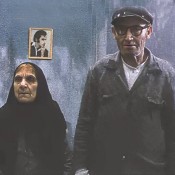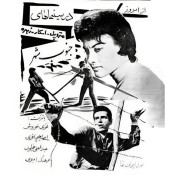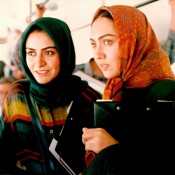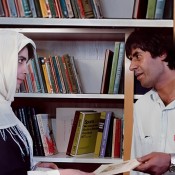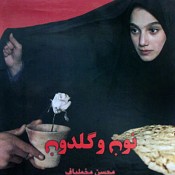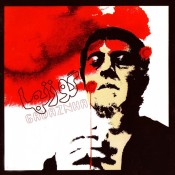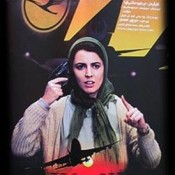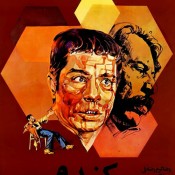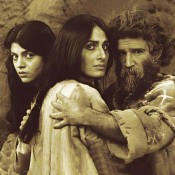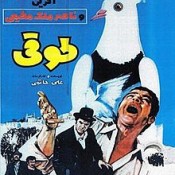A
- Abbas Kiarostami as a Universal Filmmaker
- Abbas Kiarostami, Asghar Farhadi, and Iranian Francophilia: Copie conforme, Le passé, and French Cinematic Affinities
- Abbas Kiarostami| ‛Abbās Kīyārustamī| عباس کیارستمی
- Abolfazl Purarab/Abolfażl Pūrārab/ابوالفضل پورعرب
- Abolhassan Davoodi/Abu Al-hasan Dāvūdī/ابوالحسن داوودی
- Accented Cinema: Muhsin Makhmalbāf’s Transnationalism
- Afsānah Bāyigān | Afsaneh Bayegan | افسانه بایگان
- Ahmad Reza Darvish/Ahmad Rizā Darvīsh/احمدرضا درویش
- Alireza Davood-Nejad/‛Alī Rizā Dāvūd-Nizhād/علیرضا داوودنژاد
- Ali Hatami | ‛Alī Hātamī | علی حاتمی
- Alternative Cinema: A Cinematic Revolution Before 1979
- Amir Naderi as American Indie: Reading Manhattan By Numbers as an Iranian Film
- Amir Naderi/Amīr Nādirī/امیر نادری
- Ana Lily Amirpour’s A Girl Walks Home Alone at Night (2014)
- Apartment Dramas in Iranian Cinema (2009-present)
- Arbi Hovhannisean | Ārbī Uvānisiyān | آربی آوانسیان
- Architecture as a Liminal Space in Universal Language by Matthew Rankin
- Armenian Architects and the Pahlavī Movie Theater
- Asghar Farhadi and the Dubious Conscience of Post-Revolutionary Iran
- Asghar Farhadi | Asghar Farhādī | اصغر فرهادی
- Asghar Farhadi: A Master of Moral and Aesthetic Ambiguity
- Audacious Cinema: Transfiguration of ethical storytelling in Iran
- Audacious Cinema: Transfiguration of ethical storytelling in Iran
- A Historical Wound: The Role of Ta‘ziyah as a Theater-Ritual in Iranian Cinema
- A Moment of Innocence | Nūn va guldūn | نون و گلدون
- A Party in Hell | Shab’nishīnī dar jahannam | شب نشینی در جهنم
- A Separation | Judāʾī-i Nādir az Sīmīn | جدایی نادر از سیمین
B
- Bahman Farmanara | Bahman Farmānārā | بهمن فرمان آرا
- Bahman Ghobadi | Bahman Qubādī | بهمن قبادی
- Bahram Beyzaei | Bahrām Bayzāyī | بهرام بیضائی
- Bahram Beyzaie’s Dramatic and Cinematic Oeuvre
- Bashu, the Little Stranger| Bāshū gharībah-yi kūchak | باشو، غریبه کوچک
- Beehive | Kandū | کندو
- Behrouz Afkhami/Bihrūz Afkhamī/بهروز افخمی
- Behrouz Vossoughi: The Cult Star of Failed Rebellious Masculinity
- Behruz Vosuqi/Behruz Vosūqī/بهروز وثوقی
- Between Fire and Mirror: Ibrāhīm Gulistān’s Cinematic Journey
- Beyond Stories and Facts: On Abbas Kiarostami’s ‘Documentary Objects’
- Black Seals: Missive from Iran’s National Music
- Brick and Mirror | Khisht va āyīnah | خشتو آیینه
- Bārān Kawsarī | Baran Kosari | باران کوثری
C
- Children of Heaven | Bachchah’hā-yi Āsmān| بچههای آسمان
- Children’s Cinema | Sīnima-yi Kūdak | سینمای کودک
- Children’s Cinema in Iran: The Alpha Generation and the Transformation of the Child Spectator
- Cinematic Afterlives of the Persianate
- Cinematic Male-Female Relationships
- Cinema and sports in Iran | سینما و ورزش در ایران
- Cinema Dar Qāb Tambr
- Cinema Rex Fire
- Circumventing Censorship in Iranian Cinema: On Unruled Paper and What Time Is It in Your World?
- Close Encounters of the Fifth Kind: An Analysis of Iranian Science Fiction
- Close Up | Kluz-āp | کلوزآپ
- Collective Sensuality: Exploring the Intimate Geographies of Cinema in Iran
- Configurations of Expertise: Sardar Sager in Tehran’s Film Studios
- Corporeality, Absence, and Signifiance in Rakhshān Banī-I‛timād’s Cinema: A Case Study of The Blue-Veiled
- Cracking Biocinema: Biopoetical Intimacies in Pahlavi Iran
- Creating the image of “Decent Woman” in Iranian Films (1979-1989)
- Crime Genre in Iranian Cinema
- Crimson Gold | Talā-yi surkh̄ | طلای سرخ
- Cult for Context: The Curious Case of Mārmulak
D
- Dariush Mehrjui | Dāryūsh Mihrjūyī | داریوش مهرجویی
- Daryush Arjmand/Dāryūsh Arjmand/داریوش ارجمند
- Death of Yazdgerd | Marg-i Yazdgird | مرگ یزدگرد
- Doctors and Medical Ethics in Post-Revolutionary Iranian Cinema
- Documentary Iran in The 1950s: Village Films, Akhbār-i Irān Series, & The Cold War Story of US Government’s Documentary Diplomacy
- Documenting Iran in the 1950s: Village Films
- Domestic Violence in Contemporary Iranian Cinema
- Downpour | Ragbār | رگبار
- Dukhtar-i Lur (Īrān-i imrūz va Īrān-i dīrūz) | دخترِ لُر (ایران امروز و ایران دیروز)
E
- Ebrahim Golestan | Ibrāhīm Gulistān | ابراهیم گلستان
- Ebrahim Golestan: Pioneering Narratives in Iranian Cinema
- Ebrahim Hatamikia | Ibrāhīm Hātamīkīyā | ابراهیم حاتمی کیا
- Ebrahim Khan Sahafbashi
- Ekhrajiha | Ikhrājīhā | اخراجی ها
- Encounters with the Stranger: Home, Displacement, and Identity in Bahram Beyzai’s Cinema
- Esmail Koushan | Ismāʻīl Kūshān | اسماعیل کوشان
- Exploiting Sīghah: Gender, Power, and the Marginalization of Women in Iranian Media
- Ezzatollah Entezami/Ezzatollāh Entezāmī/عزت الله انتظامی
F
- Fakhrī Khurvash | Fakhri Khorvash | فخری خوروش
- Farhad Ayish/Farhād Ā’īsh/فرهاد آئیش
- Farīdūn Rahnamā’s Postmodernist Approach in Siavash in Persepolis
- Farrokh Ghaffari | Farrukh Ghaffārī | فرخ غفاری
- Farsi Movie | Fīlmfārsī | فیلمفارسی
- Farzānah Ta’īdī | Farzaneh Taidi | فرزانه تاییدی
- Farīdūn Gulah (Fereydun Goleh): An Enduring Mystery
- Farīdūn Rahnamā’s Filmic Utopia in Iran’s Son Is Unaware of His Mother
- Farīmāh Farjāmī | Farimah Farjami | فریماه فرجامی
- Femininity and Modernity in The Sealed Soil by Marva Nabili
- Fereydoun Jeyrani/Farīdūn Jayrānī/فریدون جیرانی
- Fereydoun Rahnema | Farīdūn Rahnamā | فریدون رهنما
- Fereydun Goleh | Farīdūn Gūlah | فریدون گُله
- Filming Locations as a Defining Feature of Fīlm-Fārsī (1930-1978)
- Film Adaptations and Narrative Change in Persian Fiction
- Film Dubbing
- Film Dubbing Before 1979
- Film Music | Mūsīqī-i Fīlm | موسیقی فیلم
- Film Music | Mūsīqī’yah film | موسیقی فیلم
- Film Production at Kānūn-i Parvarish-i Fikrī
- Film-Farsi and Everyday Life: Popular Cinema and Modernity in Pre-Revolutionary Iran
- Forced Empathy and the Geopolitics of Memory in Bahman Ghobadi’s Films
- Forouzan (Parvin Kheirbakhsh) | Furūzān (Parvīn Khayrbakhsh) | فروزان (پروین خیربخش)
- Forouzan (Parvin Kheirbakhsh) | فروزان (پروین خیربخش)
- Freedom of Movement: Patriarchy, Gender and Space in Iranian Cinema
- From Golden City to Felestin: The Onomastics of Cinema Halls in Tehran
- From Hollywood to Tehran: American Movies in Iran Before the Revolution American Dreams in Iranian Theaters: Hollywood’s Rise Before 1979
- From Karkheh to Rhein| Az Karkhah tā Rāyn | از کرخه تا راین
- From Mongols to Television and Cinema
- From Persian Cats to Rap and Revolution: The Battleground for Love, Freedom, and Human Rights in Iran and its Diaspora
- From The Lor Girl to Bride of Fire: Tribal Women in Iranian Cinema
- From “Golden City” to “Felestin”: The Onomastics of Cinema Halls in Tehran
- Furūzān Bihrūz | Forouzan Behrouz | فروزان بهروز
- Fātimah Mu‛tamid’āryā | Fatemeh Motamed-Arya | فاطمه معتمدآریا
G
H
- Hadīyah Tihrānī | Hedieh Tehrani | هدیه تهرانی
- Haji Agha, the Cinema Actor | Hājī Āghā Āktur-i Sīnamā | حاجیآقا اکتور سینما
- Hamid Nematollah/Hamīd Nimatallāh/حمید نعمت الله
- Hamid Reza Ashtianipoor/Hamīd Rizā Āshtīyānīpūr/حمیدرضا آشتیان پور
- Hamoun | Hāmūn| هامون
- Hamīdah Khayrābādī | Hamideh Kheirabadi | حمیده خیرآبادی
- Hasan, the Bald | Hasan-Kachal | حسن کچل
- Hauntologies of The Present: Notes on Politics of Friendship in Férydoun Rahnéma’s Modernism
- Hingāmah Ghāzīyānī | Hengameh Ghaziani | هنگامه قاضیانی
- Home in Cinema and Women at Home (1969–1999)
- Home in Cinema and Women at Home: A Comparative Study of Pre- and Post-Revolutionary Iranian Cinema from 1969 to 1999
- Horror & Authority in Farrokhzad’s Khānah Siyāh Ast
- Hosayn Panahi/Ḥosayn Panāhī/حسین پناهی
- Hossein Alizadeh’s Film Scores
- How Frightening Your Makings: Epidemics, Mass Metamorphoses, and Bodies of the Iranian New Wave Cinema
- Humā Rūstā | Homa Rousta | هما روستا
- Hyper-Realism in Digital Films by Abbas Kiarostami
- Hānīyah Tavassulī | Hanieh Tavassoli | هانیه توسلی
I
- Ideological Cinema in Iran
- Ideology and Social Classes in Twenty-First Century Iranian Cinema
- Impasse | Tangnā | تنگنا
- Internet Cinema: A Cinema of Embodied Protest
- Invectivity in Asghar Farhadi’s Movie
- Iraj Tahmasb/Īraj Tahmāsb/ایرج طهماسب
- Iranian Cinema and International Film Festivals: A Crossroads Between Arts and Politics
- Iranian cinema and masculinity | Sinimā-yi Īrān va mardānigī | سینمای ایران و مردانگی
- Iranian Cinema and Women | Sinimā-yi Īrān va zanān | سینمای ایران و زنان
- Iranian Horror Cinema
- Iranian Poetic Cinema: Historical Perspectives and Reflections
- Iranian Women Filmmakers
- Iran Is My Home (Īrān Sarā-yi Man Ast)
- Iran’s Cinematic Winter; Under The International Politics
- Irene Zazians | ایرن زازیانس
- I’m Taraneh, 15 | Man Tarānah 15 sāl dāram | من، ترانه 15سال دارم
J
K
- Kamal Tabrizi/Kamāl Tabrīzī/کمال تبریزی
- Kambuzia Partovi/Kāmbūzīyā Partuvī/کامبوزیا پرتوی
- Katāyūn Amīr-Ibrāhīmī | Katayoun Amir-Ebrahimi | کتایون امیرابراهیمی
- Katāyūn Rīyāhī | Katayoun Riahi | کتایون ریاحی
- Khosrow Shakibaei/Khosrow Shakībāʾī/خسرو شکیبایی
- Khosrow Sinai/Khusraw Sīnāyī/خسرو سینایی
- Kianoush Ayari | Kīyānūsh ‛Ayyārī | کیانوش عیاری
- king of the hearts | Sultān-i qalb’hā | سلطان قلبها
- Kiumars Pourahmad/Kīyūmars Pūrahmad/کیومرث پوراحمد
M
- Magnificent Productions (Film-ī Fākhir) or Islamic Blockbusters of 2005-2013
- Mahdī Ivanov (Rūsī Khan): The Enigmatic Pioneer of Iranian Cinema
- Mahtāb Karāmatī | Mahtab Keramati | مهتاب کرامتی
- Mahīn Shahābī | Mahin Shahabi | مهین شهابی
- Majid Majidi/Majīd Majīdī/مجید مجیدی
- Malakah Ranjbar | Malakeh Ranjbar | ملکه رنجبر
- Male-Female Relationship in Post-Revolutionary Iranian Cinema
- Mani Haghighi/Mānī Haqīqī/مانی حقیقی
- Marvā Nabīlī: Woman, Rebel, Artist, Exile
- Marvā Nabīlī’s The Sealed Soil as Slow Cinema
- Maryam Amīrjalālī | Maryam Amirjalali | مریم امیرجلالی
- Marzieh Boroomand/Marzīyah Burūmand/مرضیه برومند
- Masoud Abparvar/Mas‛ūd Ābparvar/مسعود آبپرور
- Masoud Jafari-Jozani/Mas‛ūd Ja‛farī Jawzānī/مسعود جعفری جوزانی
- Masoud Kimiai | Mas‛ūd Kīmīyāyī | مسعود کیمیایی
- Mehdi Fakhimzadeh/Mahdī Fakhīmzādah/مهدی فخیم زاده
- Mehdi Missaghieh | Mihdī Mīsāqīyyah | مهدی میثاقیه
- Meteoric Rise and Demise of Rūhangīz Sāmīnizhād, Iran’s First Actress
- Mirīlā Zāri‛ī | Merila Zarei | مریلا زارعی
- Mohammad Ali Fardin/Moḥammad ʿAlī Fardīn/محمدعلی فردین
- Mohammad Reza Aslani | Muhammad Rizā Aslānī | محمدرضا اصلانی
- Mohsen Amiryoussefi/Muhsin Amīryūsufī/محسن امیریوسفی
- Mohsen Makhmalbaf | Muhsin Makhmalbāf | محسن مخملباف
- Morteza Hannaneh | Murtizā Hannānah | مرتضی حنانه
- Moḥammad Ali Keshavarz/Moḥammad ʿAlī Keshāvarz/محمد علی کشاورز
- Mushegh Sarvarian | Mūshiq Sarvarī (Sarvarīyān) | موشق سروری
- Mītrā Hajjār | Mitra Hajjar | میترا حجار
N
- Nargess | Narghis | نرگس
- Naser Malek Motiei | Nāsir Malak-mutī‛ī | ناصر ملک مطیعی
- Naser Malek Motiei | ناصر ملکمطیعی
- Nasser Taghvai | Nāsir Taqvāyī | ناصر تقوایی
- Nativism and Utopia in Parviz Kimiavi’s OK Mister
- Navid Mohammadzadeh/Navīd Moḥammadzādeh/نوید محمدزاده
- New Wave Cinema | Sīnamā-yi mawj-i naw̄ | سینمای موج نو
- Night of the Hunchback | Shab-i Qūzī | شب قوزی
- Nigār Javāhirīyān | Negar Javaherian | نگار جواهریان
- Nosratollah Karimi | Nusrat-Allāh Karīmī | نصرت الله کریمی
- Nīkī Karīmī | Niki Karimi | نیکی کریمی
- Nīkū Khiradmand | Nikoo Kheradmand | نیکو خردمند
- Nūrī Kasrā’ī | Nuri Kasrayi | نوری کسرایی
O
P
- Parsa Piruzfar/Pārsā Pīrūzfār/پارسا پیروزفر
- Parviz Goes to College: A 1930s Missionary Film in Context
- Parviz Kimiavi | Parvīz Kīmiyāvī | پرویز کیمیاوی
- Parviz Sayyad | Parvīz Sayyād| پرویز صیاد
- Parviz Shahbazi/Parvīz Shahbāzī/پرویز شهبازی
- Parvānah Ma‛sūmī | Parvaneh Massoumi | پروانه معصومی
- Parīnāz Īzadyār | Parinaz Izadyar | پریناز ایزدیار
- Payman Maadi/Paymān Maʿādī/پیمان معادی
- Petrocinema| سینما و صنعت نفت
- Pigāh Āhangarānī | Pegah Ahangarani | پگاه آهنگرانی
- Poetic Minimalism of Iranian Cinema: Pre-Revolution to New Wave
- Poetic Pictures: The Feminization of Iranian Cinema
- Postmodern Storytelling in Iranian Cinema: Shahram Mokri Films
- Post-Revolutionary Masculinities
- Pouran Derakhshandeh/Pūrān Dirakhshandah/پوران درخشنده
- Precarity and Possibility: The Labor of Underground Video Dealers in Iran
- Prince Ehtejab | Shāzdah Ihtijāb |شازده احتجاب
- Public Taste in Films
- Pānti’ā Bahrām | Pantea Bahram | پانتهآ بهرام
- Pūrī (Siddīqah) Banāyī | Pouri (Seddigheh) Banayi | پوری بنایی
Q
R
- Rakhshan Banietemad | Rakhshān Banī’iʿtimād | رخشان بنیاعتماد
- Rasool Mollagholi Poor/Rasūl Mullāqulī’pūr/رسول ملاقلی پور
- Ra‛nā Āzādīvar | Rana Azadivar | رعنا آزادیور
- Rebels with a Camera: Critical Zones and the Aesthetics of Iran’s Underground Cinema
- Representation of Urban Ruins in Iranian New Wave Cinema
- Representation of Women in Rasūl Mullāqulīpūr’s Cinema
- Reproducing Gender Stereotypes in Iranian Women’s Cinema: A Comparative Analysis of Three Decades
- Resistance and Compliance in The Salesman (2016)
- Revolutionary cinema | Sīnimā-yi Inqilābī | سینمای انقلابی
- Reza Kianian/Rezā Kīānīān/رضا کیانیان
- Reza Mirkarimi/Rizā Mīrkarīmī/رضا میرکریمی
- Ruqayyah Chihrah-Āzād | Roghayeh Chehreh-Azad | رقیه چهره آزاد
- Ruyā Taymūrīyān | Roya Teymourian | رویا تیموریان
S
- Sacred Canopy: Love and Sex under the Veil
- Sacred Defense Cinema | Sīnamā–yi difāʿ–i muqaddas | سینمای دفاع مقدس
- Sacred Defense Cinema: From Defense to Intervention
- Saeed Pursamimi/Saʿīd Pūrsamīmī/سعید پورصمیمی
- Sahar Dawlatshāhī | Sahar Dolatshahi | سحر دولتشاهی
- Samira Makhmalbaf | Samīrā Makhmalbāf | سمیرا مخملباف
- Samuel Khachikian | Sāmūʼil Khāchīkiyān | ساموئل خاچیکیان
- Sartorial Islamic Baroque
- Screening Love: The Forbidden in Rakhshan Banietemad’s Narges (1992)
- Self-Reflexivity in Iranian New Wave Cinema
- Shahab Hoseyni/Shahāb Ḥoseynī/شهاب حسینی
- Shahed Ahmadloo/Shāhid Ahmadlū/شاهد احمدلو
- Shahlā Rīyāhī | Shahla Riahi | شهلا رياحي
- Shahram Mokri/Shahrām Mukrī/شهرام مکری
- Shahscoping Lahore: Elective Affinites in the Era of Regional Cooperation and Development
- Shapour Gharib/Shāpūr Qarīb/شاپور قریب
- Shattered Reflections: Mise en Abyme and the Deconstruction of Reality in Post-Revolutionary Iranian Cinema
- Shifting Paradigms: Childhood Constructs in Iranian Children’s Cinema Across Five Decades
- Shirin Neshat’s Land of Dreams: Moving From The Personal to The Universal
- Shirin | Shīrīn | شیرین
- Shirin | شیرین
- Shot in the Dark: Rakhshan Bani-Etemad’s Subversion of Patriarchally Constructed Femininity in The May Lady
- Shuhrah Āghdāshlū | Shohreh Aghdashloo | شهره آغداشلو
- Silent Cinema:A Global and Local Hybrid
- Sirus Alvand/Sīrūs Alvand/سیروس الوند
- Sīnamā-yi Mawj-i Naw
- Sohrab Shahid-Saless | Suhrāb Shahīd Sālis | سهراب شهید ثالث
- Sound Movies | Sīnamā-yi Nātiq̄ | سینمای ناطق
- South of the City | Junūb-i shahr | جنوب شهر
- Speaking through Pain: Feminist Testimony and Diasporic Resistance in Born in Evin
- Still Life | Tabī‛at-i bījān | طبیعت بیجان
- Surayā Qāsimī | Soraya Ghasemi | ثریا قاسمی
- Sūsan Taslīmī | Susan Taslimi | سوسن تسلیمی
T
- Tahmineh Milani | Tahmīnah Mīlānī | تهمینه میلانی
- Tahmīnah Mīlānī’s The Hidden Half: The Art of Archetypes and Flashbacks
- Taking Refuge in Nature: An Ecocritical Reading of Citizenship and Dispossession in Contemporary Iranian Cinema
- Tambourine | Dāyarah-ʼi Zangī | دایره زنگی
- Tangsir | Tangsīr | تنگسیر
- Tarānah ‛Alī-dūstī | Taraneh Alidoosti | ترانه علیدوستی
- Taste of Cherry | Taʿm-i Gīlās | طعم گیلاس
- Tawqi | Tawqī | طوقی
- Tehran in Iranian Post-Revolutionary Films
- Tehran’s Universal Studios
- The Aesthetic of Reality: The Poetry of Cinema in Muhammad Rizā Aslānī’s Films
- The Anthropological Unconscious of Iranian Ethnographic Films
- The Apple | Sīb | سیب
- The Buttressing Gaze: Neopatriarchal Unconscious and the Biopolitics of Female Visibility in Iranian Cinema
- The Child of the Sun and the Earth
- The Cinematic and Cultural Legacy of Farokh Ghafari
- The Cow | Gāv | گاو
- The Crow | Kalāgh | کلاغ
- The Cycle of Violence as a Path to Justice in the Film Bī hamah chīz
- The cycle | Dāyarah-ʼi Mīnā | دایره مینا
- The Death of Sign; A Poetic Cinema of Mohammad Rezā Aslāni
- The Deer | Gavaznhā | گوزنها
- The Empathic Female Look: Resistance and Dialogue in the Patriarchal Spaces of Fīlmfārsī Melodrama
- The Fateful Day | Rūz-i vāq‛ah | روز واقعه
- The Garden of Earthly Utopias: On Shirin Neshat’s Women Without Men
- The Heart-Brokens | Sūtah’dilān | سوته دلان
- The Hidden Half | Nīma-yiPinhān | نیمه پنهان
- The Horror Genre in Post-Revolutionary Iranian Cinema
- The House Is Black | Khānah siyāh ast | خانه سیاه است
- The Impact of Cinema on the Socio-Cultural Change in Iran
- The International Reception of Iranian Cinema
- The Introduction and Development of Cinema in Iranian Society and Culture
- The Iranian Occidentalist Gaze: Eroticizing Western Modernity and Patriarchal Reactions in Late Pahlavi Era Cinema
- The Iranian Occidentalist Gaze: Eroticizing Western Modernity and Patriarchal Reactions in Late Pahlavī Era Cinema
- The Janitor | Sirāydār | سرایدر
- The Lizard , Guidance Patrol, and Semiotic Guerrilla Warfare: Subversion and Resistance in Iranian Cinema
- The Middle-Class Poor in Iranian Cinema: Shattered Lives, Fading Horizons in At the End of the Night (2024)
- The Morning of the Fourth Day: The Iranian New Wave and its À Bout de Souffle
- The Night It Rained | Ūn shab kih bārūn ūmad | اون شب که بارون اومد
- The Philosophical Poetry of Makhmalbaf: On Time of Love (1991) and Sex and Philosophy (2005)
- The Representation of Drugs in Iranian Arthouse Cinema and Their Social Context (2000-2025)
- The Role of National Identity in the Development of Fīlmfārsī
- The Runner | Davandeh | دونده
- The Seed of a Sacred Art: Muhammad Rasūluf Dreams for All
- The Soundscape in Diasporic Iranian Cinema
- The Stranger and the Woman: Rethinking Borders and the Homeland in Beyzaie’s Cinema
- The Swallows return to the nest | Parastūhā Bi Lāna bār mīgardand | پرستوها به لانه بر می گردند
- The Tenants | Ejāre-nešinhā | اجاره نشینها
- Through the Olive Trees | Zīr-i Dirakhtān-i Zaytūn | زیر درختان زیتون
- Through the Olive Trees: Probing the Premise of ‘Reel’ Narrative in an Eco-poetic Film
- Towards A Micropolitics of Homo-eroticism In Shirin Neshat’s Women without Men
- To Live Is to Rebel: Khayyām’s Rubāʿiyāt, My Favourite Cake, and the Politics of Joy in Iran
- Transcending Realities The Poetic Evolution of Love in Dāryūsh Mihrjūyī’s Cinema (The Pear Tree and Dear Cousin is Lost)
- Transcending Realities; The Poetic Evolution of Love in Daryoush Mehrjooyee’s Cinema (The Pear Tree and Dear Cousin Is Lost)
- Travelers | Musāfirān | مسافران
- Two Women | DuZan | دو زن
U
W
Z
#
- “Tooba” in Rakhshan Banietemad’s Cinema
- A Dragon Arrives! (2016)
- A Simple Event (1973)
- Certified Copy (2010)
- Close-Up (1990)
- Iran’s Cinema in Pursuit of Happiness: Part I (1951-1971)
- Marjān and The House is Black: First Two Films by Iranian Women Directors
- Maybe Some Other Time (1988)
- Seventeen Days to Execution (1956)
- Taste of Cherry (1997)
- The Abadanis (1993): A Historical Testimony, Silenced
- The Swallows Return to The Nest (1964)
- Travelers (1991)
- Āzītā Hājīyān | Azita Hajian | آزیتا حاجیان
- ʿAlī Nāṣirīān/ʿAlī Nāṣirīān/علی نصیریان
- “Drama” in Selected Iranian Cinema Posters: A study in Structuralist Narratology
- “Primitive Apparatus”: The Dramaturgy of Hyperrealism in the Digital Cinema of ‛Abbas Kiarostami
- “Salaam Mumbai”: Pasts and Presents of Exchange and Collaboration Between Indian and Iranian Cinema




